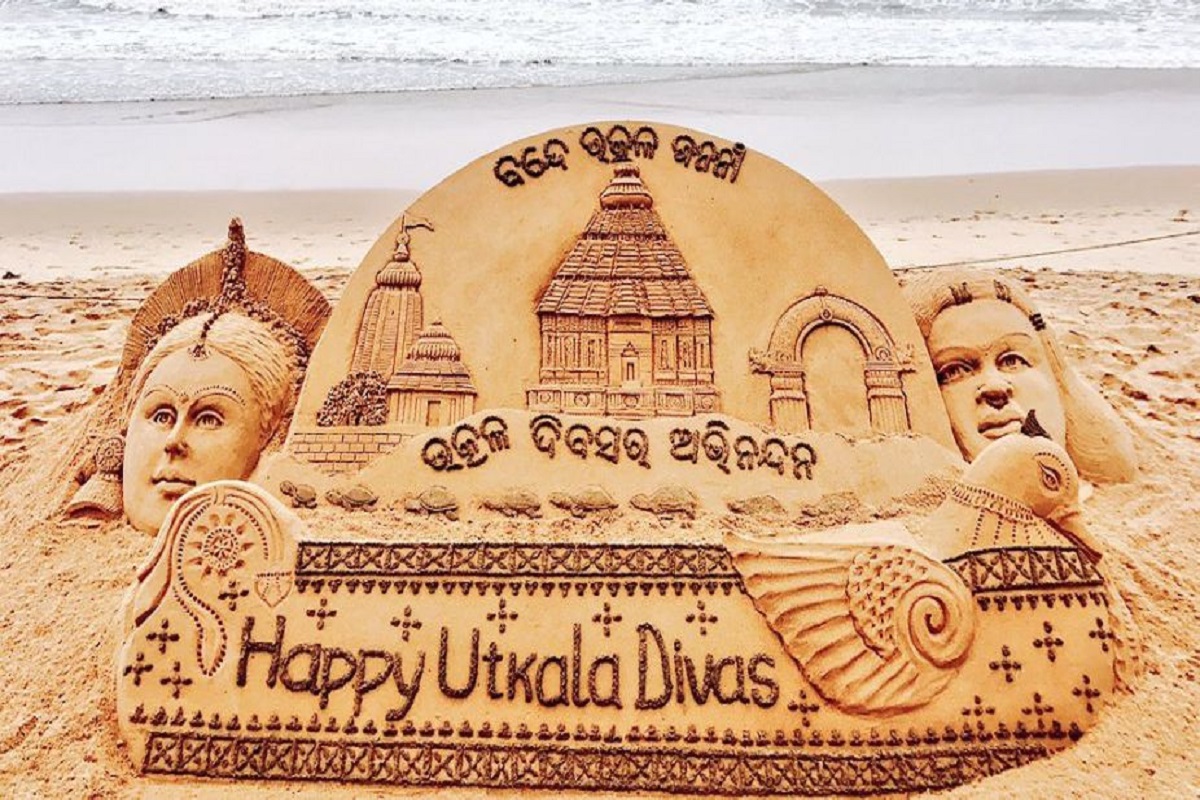Slender increase in winged guests in Odisha’s Bhitarkanika national park
The number of visiting avian winter species has risen to 1,51,614 this year from the 1,51,421 birds counted last year.
The state government has decided not to organise any official function on the occasion due to lockdown to combat coronavirus outbreak.

Odisha Day, also known as Utkal Divas and Utkala Dibasa, is celebrated on April 1 every year in memory of all the struggle that went into gaining a separate political identity for the state. (File Photo: @sudarsansand on Twitter)
President Ram Nath Kovind and Prime Minister Narendra Modi on Wednesday, greeted the people of Odisha on the occasion of Utkala Dibasa, celebrated every year to commemorate the formation of the state on linguistic basis on April 1, 1936. Odisha Day is also called Orissa Foundation Day and Vishuva Milan.
The President wished for Odisha’s bright future and prosperity.
Advertisement
ଉତ୍କଳ ଦିବସ ପାଳନ ଅବସରରେ ସମସ୍ତ ରାଜ୍ୟବାସୀଙ୍କୁ ମୋର ଅଭିନନ୍ଦନ ଓ ଶୁଭେଚ୍ଛା । ରାଜ୍ୟର ଭବିଷ୍ୟତ ଉଜ୍ୱଳମୟ, ଶାନ୍ତିପ୍ରିୟ ଏବଂ ସମୃଦ୍ଧଶାଳୀ ହେଉ ଏହା ହିଁ ମୋର କାମନା । #OdishaDay
Advertisement
— President of India (@rashtrapatibhvn) April 1, 2020
PM Modi took to Twitter and said, “Utkala Dibasa greetings to my sisters and brothers of Odisha. Praying for Odisha’s constant progress and prosperity in the times to come.”
ଓଡ଼ିଶାର ସମସ୍ତ ଭାଇ ଭଉଣୀମାନଙ୍କୁ ଉତ୍କଳ ଦିବସର ଅଭିନନ୍ଦନ । ଆଗାମୀ ଦିନ ମାନଙ୍କରେ ଓଡ଼ିଶାର ପ୍ରଗତି ଓ ଅଗ୍ରଗତି ପାଇଁ ମୋର ପ୍ରାର୍ଥନା ।
Utkala Dibasa greetings to my sisters and brothers of Odisha. Praying for Odisha’s constant progress and prosperity in the times to come.
— Narendra Modi (@narendramodi) April 1, 2020
Chief Minister Naveen Patnaik and Odisha’s Governor Prof Ganeshi Lal, wished the people on this occasion.
Prof Lal asked the people to pledge to transform Odisha into a prosperous and developed state and participate in the fight against coronavirus outbreak.
The Chief Minister remembered the legendary leaders who fulfilled the dream of formation of a separate Odisha state.
“I believe, with your support, we will emerge victorious in our ongoing fight against coronavirus,” said Patnaik.
The state government has decided not to organise any official function on the occasion due to lockdown to combat coronavirus outbreak.
Odisha became a separate province, after a long struggle of over three centuries. The formation of Orissa province under the British rule, separated from Bengal and Bihar, marked the beginning of a new journey for the state.
Odisha Day, also known as Utkal Divas and Utkala Dibasa, is celebrated on April 1 every year in memory of all the struggle that went into gaining a separate political identity for the state that was once part of Kalinga ruled by emperor Ashok, and later by Kharavela, remembered as a conqueror and the champion of Jainism, before Mughals invaded and wrested it.
Utkala Dibasa: History and significance
According to historians, Orissa was originally inhabited by tribes that lived in its hills and plains. Later, it became part of Kalinga, the ancient kingdom that Magadh king Ashok invaded in 261 BC to expand Mauryan rule. The ‘Great Kalinga War’ famous for the bloodblath it saw was eventually won by Ashok, though he could not enjoy his victory and soon embraced Buddhism.
Apart from the Great Kalinga War, recorded history had few references of the kingdom until king Kharavela’s rule began. In fact, Kalinga under Kharavela had managed to avenge the Maurya invasion by defeating Magadh. Historians say Kharavela, besides being known for establishing Kalinga as a mighty political state of India, is also credited with laying the foundation for Orissa’s fame as a land of art, architecture and sculpture.
Gajapati Mukunda Deva was the last Hindu king of Odisha, who was defeated by the Mughals in 1576. In 1803, the British took over the reins of the state, dividing it into several administrative units. The northern and western districts became part of Bengal Presidency. Later, the coastal region was made into the Province of Bihar and Orissa.
Finally, with the efforts of Oriya leaders in uniting the Oriya-speaking people succeeding, the new political province of Orissa was formed on April 1, 1936. Sir Jhon Austin Hubbak became the first governor.
Once India got its Independence, the area under Orissa almost doubled, and it became a constituent state in the Union of India in 1950.
The state’s name was changed from Orissa to Odisha on 24 March, 2011, after Rajya Sabha, the upper house of Parliament, gave its nod to the Orissa (Alteration of Name) Bill, 2010 and the Constitution (113th Amendment) Bill. The Lok Sabha, the lower house, had passed the bill and the amendment to change the name of the state from Orissa to Odisha, and that of its language from Oriya to Odia, on November 9, 2010.
Advertisement